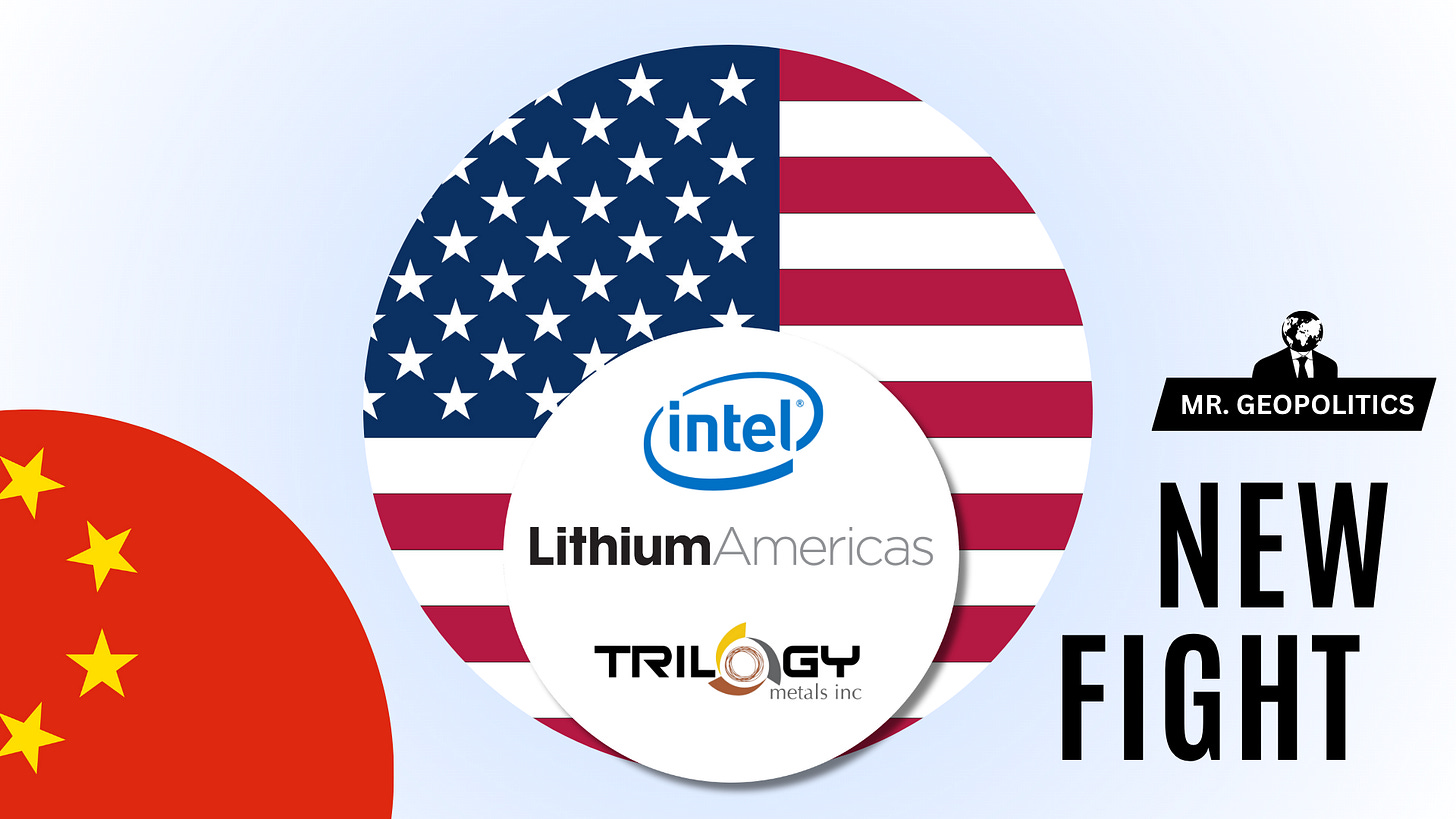The US Becomes A Global Investor
Uncle Sam has entered the boardroom
In August, when the US government took a 10% stake in Intel, I wrote the following:
What begins as a stake in Intel could quickly snowball. The US could soon take stakes in leading construction, technology, finance, and energy businesses. But then, the US government could go beyond this. First, America might begin to take stakes in foreign companies too, just as the Spanish government has a share of Airbus.
That last sentence is particularly important because it is exactly what the US has just done—thrice. In the past week, the US government announced $35.6 million for a 10% stake in Trilogy Metals, a Vancouver-based mineral company, while taking a 5% stake in Lithium Americas, another Canadian resource firm. The latter deal is through the Department of Energy (DOE) doling out $435 million in loans. The DOE is also taking a 5% stake in the Thacker Pass mining project, a joint venture between Lithium Americas and General Motors, which could produce 80,000 tonnes of lithium annually (China produces around 41,000 metric tonnes every year).
Washington, Inc
Put aside the supply chain geopolitics for a moment.
The US government already upended the global economy by taking a permanent stake in Intel—straying from previous instances when the White House took stakes but then sold them (i.e., after 9/11 with airlines or during the Great Recession with financial and auto firms). The 10% stake in Intel is permanent.
Now, the US government is starting to take stakes in foreign companies. It is becoming the new global investor. These steps are being taken to meet several geopolitical objectives: compete with China, establish new economic security, and change the US footprint.
Shaping Markets
This brings together business, geopolitics, and markets in unfamiliar ways.
The US government is starting to reshape the flow of capital in the world—in ways that go beyond controlling the dollar. As the state becomes a global investor, where “Washington, Inc” goes (or ignores) could change the attractiveness of economies and overall investor confidence. Put differently: America is gaining the power to shape markets in new ways. Of course, American investments could create new friction, including what currency loans or investments (for equity) are handed out in (i.e., USD or local currency).
Already, a link between US geopolitics and business activity is forming in technology.
Earlier this year, as the US was locked in talks for the Zangezur Corridor, connecting Armenia and Azerbaijan, Nvidia announced a $500 million project to establish the first advanced data center in the Caucasus, located in Armenia. Nvidia’s new projects are in “close proximity” to America’s geopolitics.
Next Walls
There is also greyness around how comfortable other governments will be with the US government investing in local businesses. The US is taking stakes as it collides with the world—and as nations bang the drum of economic sovereignty. In 2022, Canada forced three foreign investors (all Chinese) to divest control of Canadian resource and mining companies.
If US-Canada relations sour, like America ripping up USMCA, reimposing tariffs, or threatening new measures, American equity in local firms could become a flashpoint. Once the US invests beyond Canada, governments might force divestment if their relationship with America is disrupted. Equally possible is that some states might outright block Washington, Inc from investing in companies in strategic sectors, enraging the White House.
Sovereign Wealth Fund?
While these are major shockwaves and directions, underpinning all of them is where America is going by investing in companies. A certain door has been opened, one that US President Donald Trump proposed during the 2024 elections. It has to do with a US Sovereign Wealth Fund—something I discussed in depth in this insight.
Connected the dots today, and the US needs an overarching entity to manage its various stakes. It does not make financial or strategic sense for different agencies to control different stakes (e.g., Commerce controls Intel, Energy controls Trilogy). Add in the Pentagon, which in July invested $400 million in MP Materials and became the largest shareholder, and three different parts of the government are amassing their own “portfolios.” An SWF could better manage and expand US stakes in assets across the globe.
Chinese Headaches
America is entering economies in a new way, starting in the West, to meet the geopolitics of the moment. All of this presents a new headache for China and other US adversaries. America is going into economies, gaining control of some of the most critical firms, to steer resources and regions away from the rising Chinese order. While Chinese state firms amassed a portfolio for Beijing, the US government could do the same for itself.
The new investor that could disrupt markets and economies is not a well-seeded fund from the Gulf or a deep-pocketed fund from the Valley—it is the US state. The world must adapt to the decisions of the US government, as where and what America invests in to protect its power could rewire economies and change markets from the inside out.
-ABISHUR PRAKASH AKA. MR. GEOPOLITICS
Mr. Geopolitics is the property of Abishur Prakash/The Geopolitical Business, Inc., and is protected under Canadian Copyright Law. This includes, but is not limited to: ideas, perspectives, expressions, concepts, etc. Any use of the insights, including sharing or interpretation, partly or wholly, requires explicit written permission.







